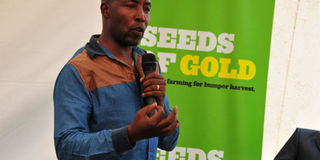The story of Katende Harambee centre

Katende Ssemwogerere at the Farm Clinic. PHOTO BY MICHAEL KAKUMIRIZI
What you need to know:
I advise farmers to invest in other business opportunities. Let farming be a stepping stone. And also if there is a chance to sell what you have at the farm provided there is good profit, sell and replace than waiting to accumulate more
In the final part of the series on the Farm Clinic, Christine Katende talked to the host
My name is Robert Ssemwogegere Katende, the executive officer, Katende Harambe Rural Urban Training Centre. It started in 2004 with the aim at teaching people how to achieve a high productivity using available resources.
The farm name was derived from our late father Katende who educated his children through proceeds from farming. He used the word harambee meaning togetherness. When he died, we decided start a farm, Katende Harambe, in honour of his good work.
We did a study, we realised that farming was not only done in the rural areas but also in urban settings and people had to only be taught on the best way to practice farming wherever they are using different methods.
The farm that is situated in a pre-urban area in Namugongo, Nsawo village, equips both low and high income earners with the best knowledge and skills.
Skills and knowledge
Farmers are given integrated farming skills where they are taught to use outputs from one project as inputs to subsidise others hence cutting on the costs. For instance, if one has a poultry farm, piggery and a plantation, he or she can use the poultry litter and coffee husks after drying it for some time to kill the dangerous bacteria, roast it and serve the pigs.
Then the waste from the pigs is turned into composite manure that is used in the garden or plantation. In this way, the farmer spends less and earns more. Also, the undigested residuals from slaughtered cattle are used as pig feeds if it properly dried. We collect residuals from abattoirs, dry it at the farm and feed the pigs.
Usually people are given theory as well as practical lessons and they also participate fully to clearly understand what they have been taught.
Katende Harambe has different demonstrations in crop and animal husbandry that a person can pick on. For crops, we have vegetables, fruits, food crops among others. Animals include pigs, cattle, goats, rabbits plus birds both local and exotic. We also do fish farming, beekeeping, water harvesting and biogas production. For the latter, we train farmers on how to extract it from different animal waste like from cattle and pigs.
Value and income
Farmers are also taught on how to make juice from mangoes and the best way to pack and keep it as a way of adding value and increasing the income. It is not only juice but we also encourage them not to sell maize seeds but flour so that they can get maize bran for the animals and poultry. They are at the same time equipped with knowledge on how to mix feeds by giving them proper ratios for a high production.
Katende Harambe has also participated in different exhibitions giving us a platform to get more clients and making connections.
The centre has trained many people including university students, farmers’ associations, schools, individuals and groups. For example, Makerere University sends 200 students per year including other universities who send bigger numbers.
The farm has had a chance to host high profile people like President Museveni, Kabaka Ronald Muwenda Mutebi, and the Belgian prime minister.
On request, Katende Harambe visits the trained farmers afterwards to find out how they are progressing or even offer advice on where they went wrong or making something better.
Although a lot is done, the farm is faced with the problem of theft. People steal the crops like matooke, cassava and eggs. There are those who target iron sheets and timber during construction at the farm yet it is still hard to fence the whole area.
Challenges and achievements
The other challenge comes with electricity where we get bills that are higher than what we use, which results in disconnections that at times put the work at a standstill.
Failure to control diseases like the time when we lost 376 pigs to swine fever. The farm managers allowed in people who came from a place that had been affected by the disease. They did not apply the preventive measures. Also the problem of losing trained workers, which slows the work given the time spent in training new ones.
Seeing people prospering in farming with the knowledge acquired from Katende Harambe and changing their lives through agriculture is a great achievement.
We have been able set up other businesses with the money made from the farm. We have made connections in different parts of the country.
Being able to employ 30 people is an achievement because in that way, we offer jobs and training as well as tackle unemployment.
I advise farmers to invest in other business opportunities. Let farming be a stepping stone. And also if there is a chance to sell what you have at the farm provided there is good profit, sell and replace than waiting to accumulate more.
We are planning expand the farm area and register Katende Harambe as a training centre that can award certificates than a document that is given after a few days of training.




